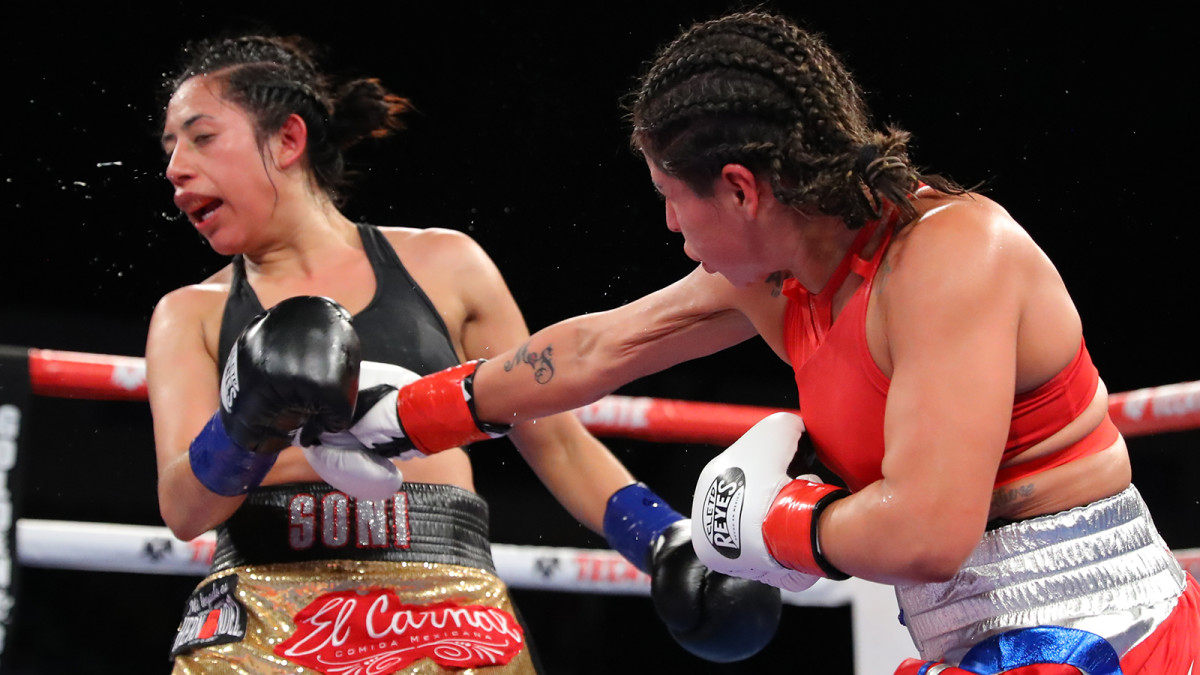For Women's Boxing, Is Going Long the Answer?


LAS VEGAS – Heather Hardy was on the ropes, and Amanda Serrano—one of the biggest punchers in women’s boxing—charged in for the finish. It was mid-September, and Serrano and Hardy were facing off inside the Hulu Theatre at Madison Square Garden in a significant featherweight fight.
For the winner, a likely shot at Katie Taylor was the prize, and the riches that come with sharing the ring with one of boxing’s most bankable women’s fighters.
For the loser, a long climb back to the top.
Serrano set a blistering pace, attacking the physically smaller Hardy with thudding combinations. In the final seconds of the first round, Serrano overwhelmed Hardy with slashing shots. Referee Mike Ortega took a long look. Before he could stop it, the bell did.
The two-minute round was up.
As women’s boxing has grown, so too have the critics weighing in with ways to improve it. An idea that has begun to take hold: Expanding the standard time of rounds in women’s boxing from two minutes to three. More time in each round creates more opportunity for knockouts, the thinking goes. Serrano almost certainly would have stopped Hardy with an extra minute. In interviews with SI.com, several other women’s fighters have said their fights could have ended earlier with longer rounds, too.
“I’m a slow starter,” says Franchon Crews-Dezurn, the unified 168-pound titleholder. “I get stronger as the round goes on. I’m an intellectual fighter. I’m reading my opponents. It takes time to do that.”
Claressa Shields is the U.S.’s most visible women’s fighter, a two-time Olympic gold medalist and a two-division world champion as a pro. Shields has gone back and forth on the subject of expanding rounds. Last year, Shields told SI.com that she believed three-minute rounds would “slow down the pace.” Three-minute rounds, Shields said, “would make women’s boxing more boring.”
Recently, Shields has pivoted.
“You see all these men that have all these knockouts, and then you see a powerful puncher like me who only has two knockouts, I don’t have enough time,” Shields said. “You give me three minutes in a round, I’ll wear a girl's ass down. We need to be the same as men.”
The strongest advocate for three-minute rounds is Marlen Esparza, a former U.S. Olympian and undefeated flyweight contender. Esparza will fight on the undercard of Sergey Kovalev’s anticipated light heavyweight title defense against middleweight kingpin Canelo Alvarez (DAZN, 9 ET). She will face Seniesa Estrada, another unbeaten fighter.
The 10-round fight will have three-minute rounds. Esparza has fought with this format before, in 2017, when she decisioned Samantha Salazar in a four-round fight. If Esparza had her way, all her fights would be contested with three-minute rounds.
Asked to explain her conviction for fighting three-minute rounds, Esparza says it comes down to money. “Men run the sport,” says Esparza. “The only way to showcase what we can do properly, we need three-minute rounds. Women complain a lot, and I do too, about how much we are paid compared to the men. If we have those three-minute rounds, we can do the same job as the men do.”
“Look at Hardy and Serrano. I love Heather, but if that fight had three-minute rounds, it wouldn’t have gotten out of the first. That happens in men’s fights. If they had to go two minute rounds, a lot of knockouts wouldn’t happen. The same way it helps the men, it can help the women.”
So what’s the problem? Safety is routinely cited. Women, doctors say, have different bone structure than men, specifically in the neck area. In 2016, Dr. Meeryo Choe, a neurologist at the UCLA Brain Research Institute who specializes in women’s brain health, gave a presentation for the World Boxing Council (WBC), where, according to the WBC, she offered up evidence that women have almost 80% more concussion probability than men. Several studies—including one done by the NCAA—have reinforced that women are more prone to sports-related concussions. The WBC says they will never sanction a women’s fight scheduled for three-minute rounds. PINK Concussions, a non-profit focused on female brain injuries, supports the WBC’s position. Lou DiBella, a longtime champion of women’s boxing, agrees with them.
Others don’t. Esparza says she has asked the WBC for its research. She hasn’t seen it. The Ringer did a deep dive on the issue last year. Several medical experts disputed the WBC’s position. Choe even backtracked on some of the comments the WBC attributed to her. She refuted the notion that women take longer to recover from concussions than men. She told the website there needed to be a study with female boxers to determine the risk.
In truth, three-minute rounds may not help women’s boxing. But there’s no question it needs a jolt. Women’s boxing is still struggling to find a foothold. Few fighters can headline televised shows. Shields is one. Taylor, the undisputed lightweight champion, is another. Promoters aren’t interested in investing in women’s boxing. They don’t see the money in it. Expanding the rounds may not change anything, but for female fighters the status quo won’t either.
“If [three-minute rounds] pushes us to get more pay, I’m for it,” says Crews-Dezurn. “I train with three-minute rounds. My husband [super bantawmweight boxer Glenn Dezurn] is my main sparring partner. I try to do everything he does. If three-minute rounds is what I have to do, I’ll do it.”
Chris Mannix is a senior writer for Sports Illustrated and on-air personality for DAZN.
